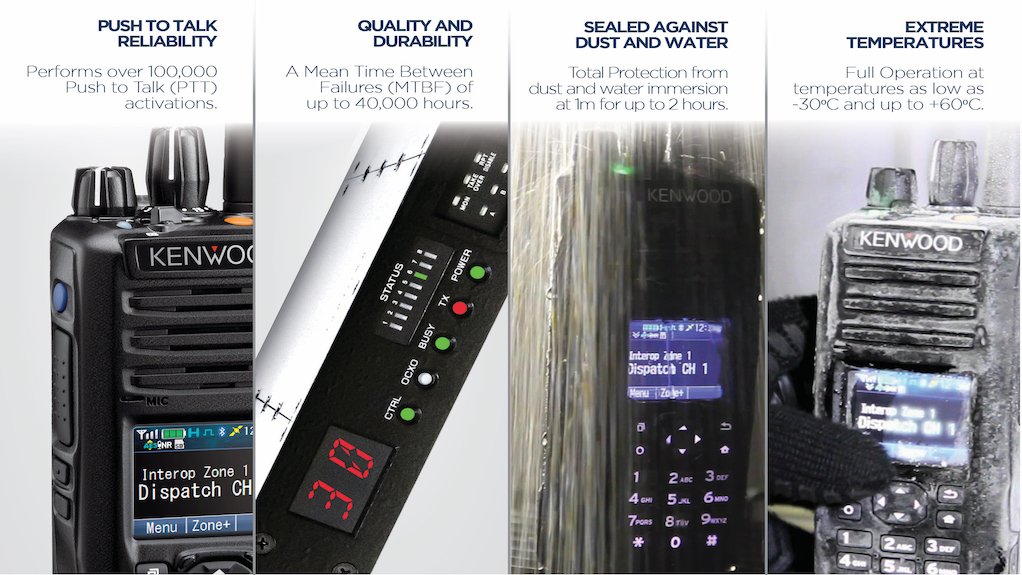Global Communications offers the mining sector uninterrupted two-way communication with Kenwood radios
Kenwood NEXEDGE digital radio systems provide a reliable, convenient and effective means of communication in mining applications as they allow cost-effective, instant and simultaneous communication with individuals and groups of people.
The Kenwood range of two-way radios is characterised by its durability, ruggedness and longevity. These characteristics led to Global Communications taking the unprecedented decision to offer a five-year warranty on specified models last year.
“During the rigorous tests undertaken on the radios during the developmental process, they are dropped, soaked, splashed and subjected to extreme temperatures to ensure their readiness for prolonged use in the harsh environmental conditions typical within the mining sector. In addition, the test team repeatedly expose them to the same conditions they would experience when their push buttons are operated tens of thousands of times over their normal lifetime,” says Sean Mervitz, Sales Manager at Global Communications (an Elvey Group company and part of the Hudaco Group of companies).
There are four pillars that underpin the reliability and robustness of these particular Kenwood radio models based on the MIL-STD 810 C/D/E/F and G specifications and IP54/55/67 and 68 environmental standards:
Environmental considerations:
- Exposure to extreme temperatures
- Dust and water resistance
Longevity indicators:
- Mean Time Between Failures (MTBF)
- Push to Talk (PTT) activations.
- Extreme temperatures
The Received Signal Strength Indication (RSSI) is a direct indication of signal performance, but it is negatively affected by extremes in temperature. Since many mines are located in remote, extremely hot and humid areas, this can pose a major problem for effective, uninterrupted communication. A receiver is rated for a certain sensitivity, and if thermal noise exceeds it, you will have a reduction in signal-noise ratio as thermal noise contributes to the overall noise floor.
The specific radios in the Kenwood range have been subjected to arduous temperature conditions, proving their successful and reliable operation at temperatures as low as -30°C and up to temperatures as high +60°C.
“The radios have been deployed on a number of large South African mines. Given the fact that the repeaters are also placed in a metal housing, which naturally increases the ambient temperature, it’s very heartening that we have not had one failure to date,” says Mervitz.
Dust and water
The mining, tunnelling and quarrying environments need equipment that can withstand extreme temperature, dust, noise, moisture and toxic exposure.
“Two-way radio systems help operators to achieve greater efficiencies and enable robust safety protocols through instant, fail-safe communications in voice and data – monitoring and managing the information and resources vital in the event of an accident or major incident,” says Mervitz.
However, mining is a particularly dirty activity that requires a number of activities which produce large amounts of dust and, to a lesser extent, ambient moisture. “Contributors to the dust issues include the extensive dust-laden blasting to detach the ore from the mine body; huge mine vehicles travelling around on a mine property and loading and offloading raw materials. Add to this the fact that mine property landscapes are generally large, open areas where unimpeded wind blows dust everywhere,” says Mervitz.
In addition to the dust, drilling in confined underground mining spaces releases trapped moisture from the rocks, which results in a damp and humid environment. Together, all these factors are a challenge for electronic equipment, including communications equipment like two-way radios.
Kenwood radio equipment with the IP54/55/67 and 68 rating, is 100% protected against solid objects like dust and sand, and it has been tested to work for up to 2 hours while submerged in water up to a depth of 1 metre.
Mean time between failure
Mean Time Between Failure (MTBF) measures how reliable and safe and a product is and is typically given in units of hours; so the higher the MTBF, the more reliable the product is. The selected two-way radios in the Kenwood NX1000 range have demonstrated a very commendable MTBF of up to 40 000 hours. This makes them ideal for use in remote areas like mines, where access to maintenance may be limited.
“MTBF signifies the average time between equipment component failure. Kenwood has sourced the highest quality parts, spares and components and run intensive tests on all of these components individually, as well as on the finished product itself, to ensure the excellent MTBF the radios are able to achieve,” says Mervitz.
“Naturally, the longer the time between product failure, the more advantageous it is, as businesses can concentrate on their core functions without worrying about how reliable their two-way radios are as communications tools. In addition, the extended MTBF results in lowered maintenance and downtime costs, as well as an increased longevity for improved return on investment,” says Mervitz.
Push to Talk activations
It is critical for mine management to retain uninterrupted two-way communication with on-site workers, making the deployment of two-way radios a cost-effective and reliable alternative to other communication modalities.
“Because the radios are exposed to inclement conditions over extended periods of time, durability and dependability are key factors in their design and manufacture. The physical operation of two-way radios, in mechanical terms, is highly dependent on the reliability of the push-to-talk (PTT) buttons,” says Mervitz.
The PTT buttons are in fact the most mechanically used component of portable two-way radios with employees often using the buttons as a mechanical microphone. “The PTT buttons are expected to work flawlessly in extreme conditions. A dependence on this form of communication means that they are often exposed to excessive use,” says Mervitz.
The PTT buttons on Kenwood radios deployed in the field at a number of mines were exposed to repeated and ongoing tests that underlined their excellence with a very satisfying PTT reliability of 100 000 activations.
For more information contact Global Communications, +27 (0) 12 621 0400, info@globalcomms.net, www.globalcomms.net
Comments
Press Office
Announcements
What's On
Subscribe to improve your user experience...
Option 1 (equivalent of R125 a month):
Receive a weekly copy of Creamer Media's Engineering News & Mining Weekly magazine
(print copy for those in South Africa and e-magazine for those outside of South Africa)
Receive daily email newsletters
Access to full search results
Access archive of magazine back copies
Access to Projects in Progress
Access to ONE Research Report of your choice in PDF format
Option 2 (equivalent of R375 a month):
All benefits from Option 1
PLUS
Access to Creamer Media's Research Channel Africa for ALL Research Reports, in PDF format, on various industrial and mining sectors
including Electricity; Water; Energy Transition; Hydrogen; Roads, Rail and Ports; Coal; Gold; Platinum; Battery Metals; etc.
Already a subscriber?
Forgotten your password?
Receive weekly copy of Creamer Media's Engineering News & Mining Weekly magazine (print copy for those in South Africa and e-magazine for those outside of South Africa)
➕
Recieve daily email newsletters
➕
Access to full search results
➕
Access archive of magazine back copies
➕
Access to Projects in Progress
➕
Access to ONE Research Report of your choice in PDF format
RESEARCH CHANNEL AFRICA
R4500 (equivalent of R375 a month)
SUBSCRIBEAll benefits from Option 1
➕
Access to Creamer Media's Research Channel Africa for ALL Research Reports on various industrial and mining sectors, in PDF format, including on:
Electricity
➕
Water
➕
Energy Transition
➕
Hydrogen
➕
Roads, Rail and Ports
➕
Coal
➕
Gold
➕
Platinum
➕
Battery Metals
➕
etc.
Receive all benefits from Option 1 or Option 2 delivered to numerous people at your company
➕
Multiple User names and Passwords for simultaneous log-ins
➕
Intranet integration access to all in your organisation





















